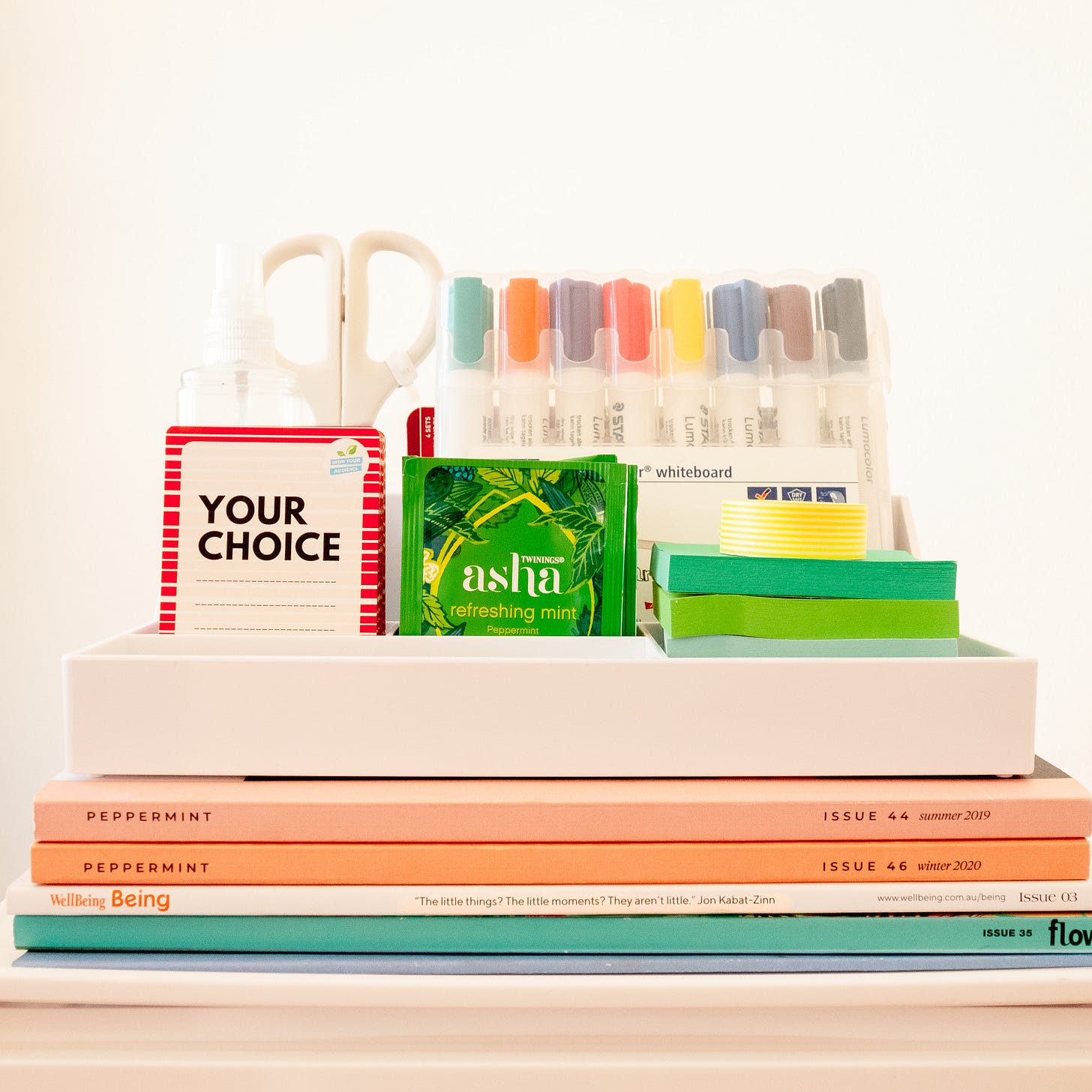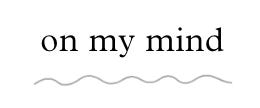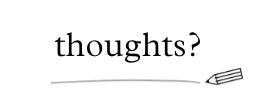The Sunday Pause #2: Decluttering Your Life for Simplicity?
A Step-by-Step Manual for Simple Living?
Welcome to The Sunday Pause, a weekly series designed to be a dedicated space, for paid members, for reflection and intentional living.
Amid our fast-paced world, this series invites you to take a pause, a moment of quiet contemplation on Sundays, to navigate the intricacies of intentional living. Here, we'll explore the essence of living with purpose, share practical tips, and create a ritual that allows you to intentionally shape your week. Join us in this weekly pause, as we navigate intentional living in our bustling lives.
So often we hear about decluttering, with homes often rammed to the rafters with stuff that we don’t need, or rooms resembling a storage facility more than a functional home within our house it is no wonder that there is a focus on getting us to have less.
Decluttering is also deeply rooted in capitalism and commercialism. In a consumer-driven culture, the onus is placed on the encouragement of a continuous acquisition of goods. Capitalism also ties economic growth to consumer spending. As a result, industries thrive on producing and promoting an abundance of products, contributing to the accumulation of possessions in households.
The rise of the consumerist mindset has fueled the desire for status and identity through material possessions. Advertisements and marketing strategies often create a sense of inadequacy or the need for constant improvement, prompting individuals to buy more, even when those purchases are unnecessary. The decluttering trend, in response, can be seen as a cyclical solution within the same consumerist framework — a process of clearing space to make room for more purchases. We need to dig deeper and address the root cause. This cycle of decluttering to make room for me makes no logical sense, serves only our consumer-driven capitalist society and big business. To really make a change we need to start from the ground up, our mindset, and work from there. And we need to address decluttering in all areas of our life, not just in our physical stuff.

Today I have some really exciting things to share:
A deep dive into decluttering and why it needs to be more than just reducing our physical items a couple of times a year.
Some guided journal questions to help you address the consumer-driven mindset.
Resources on decluttering and where to begin.
A decluttering guide + checklists.
Some Mindful exercises to help you make a permanent change.
In a consumer-driven economy, industries capitalise on the decluttering trend by promoting organisational products and services. Storage solutions, minimalist aesthetics, and various decluttering gadgets have become a lucrative market, reinforcing the idea that purchasing these items is essential for achieving a simplified lifestyle.
Let’s unpick the complex relationship between the pursuit of simplicity and the economic systems that thrive on constant consumption.
Let’s put it out there: Decluttering is trendy, and because of that it’s very easy to get drawn into it. Now I am not saying decluttering is a bad thing, in fact I believe it is an important step on the path to simplicity, but the importance lies in addressing the root cause of clutter and in the consumer-based systems that decluttering is caught up in.
Our consumer-based society capitalises on trends, whether they be purchasing trends and decluttering trends. And while decluttering might seem like a big screw you to consumerism and capitalism, if it’s not done with the right intentions and mindset shifts, then it’s just feeding back into the same dreadful model.
Think of it this way, you’re a by-product of the era you have grown up in, and for many of us that is the era of more. More of everything: stuff, technology, experiences. Everything is bigger, brighter and shinier than it has been in previous generations. The market knows this and is producing to that demand. Everything is about more, adding more things to your life and encouraging you to get FOMO if you don’t have it.
But it’s not just that, the market is smart to the notion that people are feeling more overwhelmed than ever, especially with their physical stuff so has jumped on the decluttering bandwagon and positioned itself front and center. You can now find a plethora of storage solutions, minimalist aesthetics, and various decluttering gadgets, creating a profitable industry. It is all connected and while not always obvious it is encouraging us to buy more stuff. Hands up if you have bought something in the past to help you get more organised? Me too. I think most of us have because we aren’t immune to the subliminal messaging and it takes slightly more work than just deciding you own too much of something, it requires a complete mindset shift. But the good news is that it is not only possible but also achievable. The idea that you need more to be able to declutter or get organised reinforces the idea that acquiring these items is crucial for attaining a simplified lifestyle, further entwining the act of decluttering with consumerism.
Decluttering, consumerism and addressing our mindset is also deeply rooted in sustainability. The constant turnover of trends and fashions encourages individuals to discard perfectly functional items in favor of the latest styles, contributing to a culture of disposability. We’ve all seen images of discarded clothes in the dessert that it reported can be seen from space. This is horrific and we cannot go on this way, but also it's time to stip supporting these unethical practices that get us here in the first place. Listen, it’s not our fault, the people than create these systems and advertisements are really clever. It’s more than just appealing to us and getting us interested, it is getting into the psyche of who we are a human beings and how our brains function. The cycle of decluttering and reacquiring possessions not only sustains capitalism but also perpetuates environmental concerns too.
Now I don’t want you to think “Ah, Decluttering is not worth it, I won’t bother” but instead start to deconstruct this consumer-based system we are all a part of. When you start deconstructing and understanding the mindset shift that can change your way of thinking perfectly, then you are ready to declutter with intention.
Decluttering can offer genuine benefits in terms of simplifying and organising our life, and I do think it is often a great starting point in our journey towards simplicity. However, its commodification within the consumerist framework underscores the complex relationship between the pursuit of simplicity and the economic systems that thrive on constant consumption.
Some Guided Journal Questions to help you:
Reflect on your current relationship with material possessions. How would you describe your mindset towards acquiring and owning things? Consider any emotions or thoughts that arise when thinking about your belongings.
Dig deeper into the motivations behind your purchases. What drives your desire to buy new things? Are these purchases influenced by genuine needs, societal expectations, or a desire for temporary satisfaction?
Challenge consumer conditioning by questioning the narrative of constant acquisition. How can you detach your self-worth from material possessions? In what ways does minimalism or intentional living align with your personal values?
Establish long-term goals for shifting your mindset towards intentional living. What specific changes do you want to make in your consumer habits, and how can you ensure these changes are sustainable over time?
Explore mindfulness techniques to help you become more aware of your consumption patterns. How can being present in the moment influence your decision-making when it comes to acquiring new possessions?
Some resources to help you:
Podcast episodes you might want to listen to -
People I recommend checking out -
Shannon from The Simpl Living Co
Decluttering Guide -
Set Your Intentions:
Before diving into decluttering, take a moment to set your intentions. Ask yourself why you want to declutter and what you hope to achieve. Whether it's creating more physical space, reducing stress, or fostering a minimalist lifestyle, clarifying your intentions provides a roadmap for your decluttering journey.
Assess Your Space:
Begin by assessing each area of your living space. Identify areas that feel cluttered or disorganised, and take note of items that no longer serve a purpose or bring you joy. This step lays the foundation for targeted decluttering and prevents overwhelm.
One Room at a Time:
For a more structured approach, declutter one room at a time. Start with the room that feels most overwhelming or the one you spend the most time in. Break down the decluttering process into manageable tasks, focusing on clearing and organizing each space before moving on to the next.
Mindful Decision-Making:
Cultivate mindfulness during the decluttering process. Be present with each item, and consider its significance in your life. Ask yourself if it aligns with your current values and if it contributes positively to your wellbeing. Mindful decision-making ensures that you retain items that truly add value to your life.
Sorting and Organising:
Create designated piles for items you want to keep, donate, sell, or discard. Organie kept items in a way that enhances accessibility and functionality.
Digital Decluttering:
Extend your decluttering efforts to the digital realm. Organise your digital files, unsubscribe from unnecessary emails, and declutter your digital devices. A streamlined digital space contributes to mental clarity and reduces digital overwhelm.
Maintenance and Mindful Consumption:
Once you've decluttered your space, establish habits for maintenance. Regularly assess incoming items and be mindful of your consumption habits. Adopt a one-in, one-out rule to prevent accumulation and ensure that each new possession serves a purpose.
Download my Decluttering Checklists -
Mindfulness Techniques to help you become more aware of your consumption patterns:
Mindfulness can be a powerful tool for increasing awareness of your consumption patterns and fostering a more intentional and conscious approach to acquiring possessions. Here are some mindfulness techniques to help you become more attuned to your consumption habits:
Mindful Breathing:
Incorporate mindful breathing exercises into your daily routine. Take a few moments to focus on your breath, inhaling and exhaling slowly. Use this time to ground yourself in the present moment before making purchasing decisions.
Pause Before Purchasing:
Practice the art of pausing before making a purchase. When you feel the impulse to buy something, take a moment to pause and ask yourself why you want it. This brief pause can create space for more conscious decision-making.
Gratitude Practice:
Cultivate a daily gratitude practice where you reflect on the possessions you already have. This practice can shift your focus from acquiring more to appreciating what you currently own, fostering contentment and reducing the desire for constant consumption.
Digital Detox:
Take breaks from constant exposure to advertisements and online shopping platforms. Consider implementing a digital detox, even if just for a few hours. This break allows you to reevaluate your actual needs versus the influence of external marketing.
Intention-Setting Rituals:
Before embarking on a shopping trip or making an online purchase, set clear intentions. Ask yourself why you are making this purchase and what value it adds to your life. Establishing intentions can guide you toward more mindful and purposeful consumption.
By integrating these mindfulness techniques into your daily life, you can develop a heightened awareness of your consumption patterns and gradually shift towards a more intentional and mindful approach to acquiring possessions.
Why decluttering is about more than just the physical:
Beyond the visible impact on our living spaces, decluttering brings about a sense of mental liberation. As we sift through possessions, we navigate the labyrinth of memories, emotions, and attachments tied to each item. Letting go becomes a therapeutic process, releasing not just physical clutter but emotional baggage. This newfound mental clarity enables us to focus on the present moment, fostering a mindset that is unburdened by the weight of unnecessary belongings.
Decluttering is an exploration of values and priorities. It prompts us to question the purpose and significance of each possession, encouraging a more intentional approach to consumption. In a world that often equates abundance with success, decluttering becomes a counter-cultural act—an assertion that true richness lies not in amassing material wealth but in cultivating a life rich in experiences, connections, and personal fulfillment. Through this lens, decluttering becomes a gateway to mindful living, guiding us to align our surroundings with our deepest values and aspirations.
Other things we can declutter from our lives, outside of physical items:
Beyond physical possessions, there are several areas of life that can benefit from the decluttering process. Embracing a minimalist and intentional mindset extends beyond tangible belongings to create space in various aspects of your life. Here are some areas to consider decluttering:
1. Digital Space:
Emails and Digital Files: Declutter your digital life by organising and deleting unnecessary emails and files. Create folders to streamline your digital workspace.
Apps and Notifications: Review your phone and computer apps. Uninstall apps that you rarely use, and turn off non-essential notifications to reduce digital noise.
2. Time and Schedule:
Overcommitments: Declutter your schedule by reassessing your commitments. Identify activities or obligations that no longer align with your priorities, and gracefully let go of them.
Time-wasting Habits: Identify and minimize time-wasting habits. This may involve setting boundaries on social media usage, reducing screen time, or eliminating activities that don't contribute positively to your life.
3. Relationships:
Toxic Relationships: Evaluate your social circle and consider distancing yourself from toxic relationships that drain your energy and contribute negativity.
Digital Relationships: Review your online connections on social media platforms. Unfollow accounts that no longer resonate with you or contribute positively to your online experience.
4. Mind and Thoughts:
Negative Thoughts: Practice decluttering your mind by letting go of negative and intrusive thoughts. Engage in mindfulness or meditation practices to create mental clarity.
Excessive Information: Reduce information overload by being selective about the media you consume. Unsubscribe from newsletters, unfollow social media accounts, or limit exposure to news that induces stress.
5. Goals and Aspirations:
Unrealistic Goals: Reassess your goals and aspirations. Eliminate goals that no longer align with your values or are no longer relevant. Focus on quality over quantity in your ambitions.
6. Finances:
Unnecessary Expenses: Review your spending habits and cut back on unnecessary expenses. Create a budget that aligns with your financial goals, and declutter your financial obligations.
7. Hobbies and Activities:
Unused Hobbies: Assess your hobbies and activities. Let go of hobbies that no longer interest you or align with your current lifestyle. Focus on activities that bring genuine joy and fulfillment.
8. Physical Health:
Unhealthy Habits: Declutter your lifestyle by addressing unhealthy habits. This may involve reassessing your diet, reducing reliance on stimulants, and adopting habits that contribute to overall well-being.
9. Spiritual and Emotional Space:
Unresolved Emotions: Reflect on your emotional well-being and work on resolving any lingering negative emotions. Practices such as journaling, therapy, or meditation can help create emotional clarity and space for growth.
Decluttering these various aspects of your life contributes to a holistic sense of wellbeing, promoting a more intentional, mindful, and purposeful existence. It's about creating space for what truly matters and letting go of anything that hinders personal growth and fulfillment.
The journey towards mindful consumption and intentional decluttering is a transformative process that transcends the mere act of organising our physical spaces. It involves a profound shift in mindset and is one that invites us to re-evaluate our relationship with possessions, question societal narratives of constant acquisition, and foster a deeper connection to the present moment. As we strive to become more mindful consumers, the practice of decluttering with intention emerges not only as a means to create physical space but as a gateway to mental clarity and emotional freedom.
Changing our mindset around consumption and decluttering is an ongoing and empowering endeavor. It requires continuous self-reflection, an exploration of our values, and a commitment to being present in each moment of decision-making. Embracing the principles of intentional living enables us to break free from the constraints of a consumer-driven culture, allowing us to cultivate contentment with what we have and find fulfillment beyond the fleeting gratification of material possessions. Before I leave you today I want to remember this: perfection is unattainable. If you fall back into old habits at any point you haven’t failed. Save this post so you can come back to it time and time again.
As we navigate this intentional path, we not only create harmonious living spaces but also contribute to a broader societal shift—one that values mindfulness, purpose, and a profound appreciation for the simplicity that accompanies a life lived with conscious intention.
Until next time,











